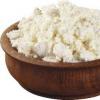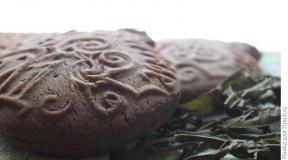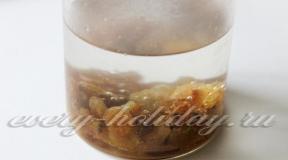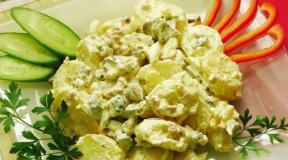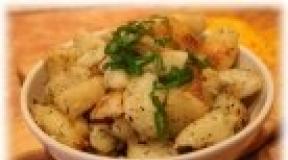Coconut oil - composition, medicinal and beneficial properties, benefits and harms. Application
Coconut oil can be called a versatile product because it is used in many areas - cosmetology, cooking, medicine, and even in the household: it is used to polish wooden furniture. The product is extracted from coconuts, or rather from their pulp, which is called copra. Like most oils, coconut is made in two ways - hot or cold pressed.
The oil produced by hot pressing partially loses its useful components. The cold-pressed product is considered the most valuable, as it retains almost all the nutrients from the coconut. This method is used less often than the first, since it allows you to extract only 10% of all the oil present in the pulp of the nut. Such oil is more valuable and more expensive than that obtained by hot pressing.
Coconut oil stored at room temperature and below is unusual for vegetable oils. It can be in the form of a thick, whitish-creamy liquid or small, hard, soap-like lumps. Oil becomes liquid and transparent when heated to 26 degrees and above.
Coconut oil composition
The main constituent of coconut oil is polyunsaturated fatty acids, recognized by scientists as vital for humans. Since they are not synthesized by the body, they can only be obtained from the outside. Coconut oil is one of the best sources of these substances. It contains fatty acids:
- myristic;
- lauric;
- oleic;
- palmitic acid;
- caprylic;
- linolenic;
- arachidonic;
- stearic;
- capric.
In addition, the product boasts calcium, phosphorus, and vitamins A, C and E, which are valuable substances that preserve beauty and youth.
Types of coconut oil
There are two varieties of Coconut Oil - nonfood and food... The latter can be found in stores. It is intended for culinary purposes. Its uniqueness lies in the fact that when heated, it does not emit carcinogens. They can replace the usual sunflower oil, and then the dishes will acquire an exquisite taste. It is suitable for cooking baked goods, sweet and vegetable dishes, seafood, salad dressing and adding to cereals and drinks.
Manufacturers use the product as a food additive for the production of margarine and cake fillings.
The unique combination of fatty acids endows the product with medicinal properties. Metabolized by a special method, they have a positive effect on the brain and improve the condition of people suffering from epilepsy and Alzheimer's disease. Substances in the product increase the level of "good" cholesterol and lower the level of "bad" cholesterol, they also have and this reduces the likelihood of developing vascular and heart diseases. Coconut oil boosts immunity and, if consumed regularly, reduces the likelihood of cancer and restores thyroid function.
The benefits of coconut oil also lie in its ability to help treat many skin conditions. It has antifungal, antiviral, antibacterial and anti-inflammatory properties. This allows it to be used to combat fungal infections of the skin, hair and nails, with dermatophytosis and mycosis.
It can also relieve the oil from diseases caused by Candida fungus, dermatitis and eczema. It can also be used as an aid in the treatment of lichen, even ringworm.
For hair care, the product can be used without additional components. Rubbing a little oil into curly hair will make it easier to style. To improve the condition of the curls, it is enough to apply the oil to the strands and scalp for 30 minutes, and then rinse off using regular shampoo. Rub in the warm product with light massage movements.
Coconut oil is good for the ends of the hair: regular use will get rid of the split. You can prepare masks:
- Oil... The product is combined with other oils: mustard, castor, peach and burdock. To prepare the mask, combine three different types of oils in a teaspoon, and then heat them in the microwave or in a water bath.
- Strengthening... Combine 0.5 tablespoons of glycerin with 40 grams of oil, yolk and 10 milliliters of wine vinegar.
- Nutrient... In a bowl, mash a banana and place 1.5 tablespoons of cream or sour cream and 40 grams of butter in it.
Coconut oil is not easy to wash off your hair. To make it easier, do not apply it to strands in large quantities, and also use it with less fatty oils or heated dairy products.
Coconut oil for face
The product is ideal for dry skin. The oil nourishes, eliminates inflammation, softens, moisturizes and regenerates the skin, and also prevents cracks, peeling and irritation. It is also useful for other types of skin. For example, for problem skin, the remedy will help eliminate acne and accelerate the healing of wounds after them.
The remedy fights another age-related problem - pigmentation. To reduce its intensity, you need to lubricate problem areas.
Coconut oil for skin can also be used as a sunscreen. It will help prevent burns, protect from ultraviolet radiation and provide an even tan. A good cleanser will come out of it, which cleanses the skin and easily removes makeup. It is also a good protective agent, improves blood circulation and helps to flush out toxins.
Coconut oil for a healthy diet
Coconut oil obtained from the dried pulp of the coconut tree (copra). In the production of coconut oil, the hardened pulp of the coconut is first separated from its hard shell, then the copra peeled from the shell is dried, crushed, and then oil is obtained from it by pressing. The most common method used in the production of coconut oil is hot pressing. But also for the production of coconut oil, cold-pressed technology is used, which makes it possible to obtain coconut oil with the highest nutritional and biological value, but at the same time, more expensive. The oil has a characteristic delicate, sweetish aroma and a pleasant slightly nutty flavor. Refined and unrefined oils are produced. Coconut oil is classified into food grade and cosmetic grade.
Today, the main world producers of coconut oil are Thailand, Malaysia, India, the Philippines, Sri Lanka, Indonesia. Coconut oil is most often supplied to Russia from Thailand, India, less often from the Philippines and Indonesia.
Special beneficial properties
Coconut oil - beneficial properties
- Coconut oil is completely absorbed by the body, without being deposited in fatty deposits, therefore, it is especially useful for people involved in sports and leading an active lifestyle.
- Strengthens the immune system.
- A valuable cosmetic product.
WITHleave
Coconut oil - composition, fatty acids, vitamins and minerals, calories
The melting point of coconut oil is about 25 o C. If the coconut oil thickens, then this only confirms its naturalness. To melt the butter, place the container with the butter in a glass of hot water or heat the butter in a water bath.
Coconut oil is a universal remedy and is suitable for the care of the scalp, neck, décolleté, face, hands and feet.
- Base oil for enriching creams, masks, balms for skin care, designed to nourish, soften or moisturize the skin.
- A nourishing and regenerating oil for damaged, split ends, fine, brittle or colored hair.
- Massage oil.
- Means for cleansing the skin and removing makeup.
- Mouthwash.
- Lip balm.
- Balm after shower or bath.
- A protective agent against the harmful effects of wind and frost on the skin.
- Hand and nail cuticle care products.
- A softening and soothing product for the skin after manicure, pedicure, epilation, shaving.
- Sunscreen "before" and "after" sunburn.
- Means for the care of sensitive baby skin, as the oil is hypoallergenic and has an anti-inflammatory and emollient effect.
Coconut oil for face and body
Cosmetic properties of coconut oil:
- It is quickly absorbed without leaving an oily sheen and sticky feeling, nourishes and softens the skin.
- Tones the skin, gives it elasticity and firmness, helps to smooth out fine wrinkles.
- Prevents the appearance of acne and acne.
- It helps the skin retain moisture and restore the protective functions of the epidermis, protects the skin from drying out and peeling, and helps to restore the normal acid-base balance of the skin.
- Accelerates the natural regeneration of the skin.
- Prevents the appearance of age spots and premature aging of the skin.
- It helps to restore the lipid-protein balance of the skin, disturbed as a result of the frequent use of low-quality soaps, shampoos and shower gels.
- Soothes irritated or inflamed skin.
- Protects the skin from excessive exposure to the sun's ultraviolet radiation.
- Softens rough skin on the feet.
Coconut oil for hair
Coconut oil is an excellent regenerating agent for the care of damaged, thinned, dull, split ends, brittle or frequently colored hair. With regular use of coconut oil, hair becomes strong, shiny, soft, silky and manageable.
Coconut oil creates a protective film that prevents the leaching of protein from the hair structure, well nourishes and moisturizes the scalp, activates hair growth and prevents hair loss, helps restore hair structure and prevents split ends, relieves scalp irritation and helps fight dandruff due to antifungal and anti-inflammatory properties.
Coconut oil protects hair from the harmful effects of frequent washing and dyeing, from mechanical damage to hair when combing, from drying out with a hairdryer and frequent perms. Coconut oil also protects hair from excessive exposure to sunlight, salt water and sea breeze, so it is recommended to apply it to hair before sunbathing or sea baths.
Coconut oil spreads easily and evenly over the entire surface of the hair, is quickly absorbed by the skin and does not leave a greasy shine on the hair.
The oil is applied as a mask before washing your hair. Massage the oil from root to tip. It is washed off with shampoo during washing. You can also apply a small amount of oil to washed hair: lubricate the roots and ends.
It is better to use refined oil in the composition of hair masks, and unrefined coconut oil is better to use for the care of the ends of split ends.
It is advisable to avoid applying unrefined coconut oil to the scalp due to its comedogenicity. But everything is individual and it is impossible to say with certainty that a remedy called comedogenic for one person will be just as harmful for another. Therefore, it is necessary to check the effect of the product on yourself.
Cooking applications
Due to the high content of saturated fatty acids, coconut oil practically does not undergo oxidation and has a long shelf life. It hardly reacts with air, therefore, even without a refrigerator, it remains usable throughout the entire shelf life.
Coconut oil does not lose its taste and useful properties when heated to a high temperature, it is not prone to rancidity, which is why, unlike other oils, it can be used for frying and deep-fat cooking, while it does not become carcinogenic.
Coconut Oil - Cooking Uses
Nutritionists assure that fats must be present in a balanced diet, albeit in a smaller amount than proteins and carbohydrates. However, replenishing lipids by eating hamburgers and fries will not work without harm to your health. Healthy lifestyle advocates recommend using coconut oil as a source of essential fats. How safe is it for the body?
Pros and cons: two sides of coconut oil
At the end of the 13th century, thanks to the book of the Italian traveler Marco Polo, the world learned about the coconut tree, but the production of oil was still far away. Only a century later, the plant spread in Southeast Asia, and only in the 15th century - in India. And it was here that they began to receive for the first time a valuable product and use it for cosmetic and culinary purposes.
Compound
The oil is made from fresh coconut pulp or copra (dried pulp), and how good or bad it is for the body can only be judged by analyzing the composition. Fatty acids account for about 99% of the product:
- polyunsaturated (Omega-3, Omega-6);
- monounsaturated (oleic, palmitoleic, nervous, etc.);
- saturated (nylon, caprilic, palmitic, oily, lauric, capric, stearic, etc.).
Also, the oil contains a small amount of vitamin E, minerals (phosphorus, zinc, calcium, etc.), phytosterols.
For the first time, the pulp of coconut for the manufacture of oil began to be used in India
Benefit
The nutritional composition of the product makes it valuable not only for beauties who use the oil to beauty their skin and hair, but also for adherents of a healthy lifestyle. The complex effect of the components it contains when consumed in food:
- provides immunostimulating, anti-inflammatory and antibacterial properties;
- supports a favorable intestinal microflora;
- smooths out hormonal imbalances;
- improves the function of the liver, kidneys, the work of the digestive, endocrine, cardiovascular, nervous systems;
- restores the structure of bones, muscles, skin and hair from the inside;
- regulates water balance;
- normalizes fat metabolism, blood glucose and cholesterol levels;
- has an antioxidant effect;
- reduces blood viscosity, strengthens blood vessels;
- has a beneficial effect on cellular metabolism.
These properties allow the oil to be used for health purposes and make it beneficial for:
- infectious and inflammatory diseases of the genitourinary system;
- colds and flu;
- predisposition to varicose veins and other diseases of the cardiovascular system;
- hormonal disorders;
- depression and stress;
- decreased performance, loss of strength;
- joint pathologies;
- diabetes and obesity.
The antioxidant effect of the product makes it useful for the prevention of early aging, Alzheimer's disease, and oncology.
Harm
Oil damage is determined by four factors:
- high calorie content - about 890-900 kcal per 100 g;
- a large amount of saturated fatty acids - the product surpasses even butter in their content;
- distribution of cheap, low-quality coconut oil on the market - the low price of a low-grade product becomes a determining factor for those who want to buy a product that will not benefit the body;
- the presence of contraindications - in some cases, the oil is dangerous to health.
Calorie content
Despite its high calorie content, coconut oil is often recommended for those trying to lose weight. This product makes the process of getting rid of unnecessary pounds more efficient due to:
- activation of metabolic processes;
- normalization of the digestive and endocrine systems.
However, coconut oil is not a panacea that guarantees a slim figure: without a balanced diet and rational physical activity, you will not be able to lose weight. We must not forget about moderation. Although it is believed that eating coconut oil does not lead to fat deposition, there is no scientific research to support this position, so you should not lean on the product.
The daily norm of coconut oil for an adult is 2-3 tablespoons, for the elderly - a tablespoon, for children - no more than a coffee spoon.
Saturated fat
The controversy continues to this day about how safe the saturated fats in coconut oil are. However, most researchers state that saturated fats of animal origin (lard, butter, cheese) are long-chain, while vegetable fats (coconut oil) are medium-chain, so they are better absorbed by the body.

Coconut oil has more saturated fat than butter, but because it is medium-chain rather than long-chain, it is preferable for a healthy diet.
Contraindications
Eating coconut oil can harm your body when:
- individual intolerance to the product;
- cholecystitis;
- irritations of the gastric mucosa.
An overdose of the product is fraught with food poisoning, and in some patients with pancreatitis, after consuming the oil, nausea and diarrhea appear.
So that the use of coconut oil does not harm the body, it is necessary to consume it in moderation, not exceeding the recommended norms, and also to buy a quality product.
Subtleties of choice
When deciding to buy oil, it is worth understanding the assortment.
Receiving method
According to the production technology, coconut oil can be:
- cold pressed;
- hot pressing;
- obtained by roasting.
The table below describes the specifics of each species.
Table: characteristics of methods of obtaining
| Method | Obtaining process | Characteristics | Application |
| Cold pressed (Virgin and Extra Virgin) | It is squeezed out by pressing without exposure to high temperatures. |
|
Most preferred for human consumption. |
| Hot spin | It is squeezed out in a centrifuge under the action of a hot press from the dried pulp. |
|
Recommended for cosmetic purposes only. |
| Roasting | After drying, the pulp is fried at high temperatures, releasing oil, which is then filtered. |
|
The benefits for external and internal use are questionable. |
In addition, there are other types of oil. So, if there is a Coconut Oil label on the package, the product was extracted using chemical solvents, it cannot be eaten. Hydrogenated oil is an industrial oil that is sometimes used in confectionery production.

Hot-pressed coconut oil is commonly used for topical cosmetic applications
Cleaning
The resulting coconut oil can be refined (refined) or unrefined (unrefined).
In the process of purification, the product loses the valuable substances contained in it, the resulting mass is devoid of any taste, aroma and nutritional value.
Refined oil can also be deodorized and bleached, which means that in order to remove impurities, the product has been treated with steam and filtered with a special clay.
Only unrefined cold-pressed product is suitable for use in food for health improvement. For culinary purposes, you can also use refined oil, it will not bring benefits to the body, but it will serve as a more preferable substitute for margarine.
If the oil is designated by the manufacturer as highly refined, the product does not contain lauric acid and can be used as a food additive or for cosmetic purposes. There is also fractional pomace, which does not contain anything other than fatty acids, it is suitable for soap making and perfumery experiments and is considered conditionally useful, but is not used for eating.
Other factors
What else to look for when buying oil? Here are five guidelines to help you make the right choice:
- External characteristics. Healthy coconut oil has a delicate, sweet aroma and nutty flavor that literally melts in your mouth. The consistency is thick, but not viscous. Good oil should be clear or white in color; slight turbidity or golden tint is acceptable. Yellow color, sour aroma, sediment - “symptoms” of a low-grade product.
- Compound. The oil should not contain GMOs, food additives, dyes, flavors.
- Availability of a certificate. A manufacturer with a good reputation is always ready to provide a document confirming the quality of the product.
- Brand. Judging by the reviews, edible coconut oil produced by the following companies has proven itself well: Parker Organic, Dabur, Parachute, Marico Limited, Healthy Origins, Jarrow Formulas, Nature’s Way. Ideally, the oil producer should be located in the same country where the raw material is grown. This fact greatly increases the likelihood that coconuts will not have time to spoil during transportation.
You can store the oil at room temperature for 2–4 years in a tightly closed glass container, away from sunlight at a humidity not exceeding 60%. After opening the container, it is preferable to place the product in the refrigerator.
Video: how to choose coconut oil
How to eat oil
Inside, coconut oil is used either in pure form or as an ingredient in the preparation of a particular dish.
In pure form
For medicinal purposes and for weight loss, it is recommended to dissolve 1-2 tablespoons of the product on an empty stomach in the morning. It is recommended to take food half an hour after that. This dosage should be approached gradually: for a start, half a dessert spoon is enough, while it is recommended to wash down the "medicine" with warm water. There is no information on the duration of therapy.
If the aftertaste of the product seems unpleasant, after the butter has melted in your mouth, you can drink freshly squeezed juice.
When using oil for treatment, a doctor's consultation is mandatory: most diseases require an integrated approach. If there are no special health problems, it is enough just to include the product in the diet as part of the usual dishes.

It is important to consult your doctor before starting coconut oil treatment
Fortification of the diet: recipes
At temperatures up to 25-28 ° C, coconut oil has a solid consistency, when heated it becomes liquid. This greatly expands the possibilities of the culinary application of the product. So, it can be used as a substitute for margarine or butter in baked goods, and as a salad dressing. Housewives also value coconut oil for its high smoke point, which makes it possible to use it for frying (for this purpose, you can even take a refined product that starts burning at even higher temperatures).
Below are recipes for delicious and healthy dishes that will appeal to even supporters of proper nutrition.
Salads
Any salad can be seasoned with melted coconut oil. In this case, the ingredients should not be cold, otherwise the healthy "sauce" will solidify. Below are three ideas for original and delicious salads:
- Vegetable with feta cheese. Cut the tomatoes and cucumbers (300 g each), one avocado, lettuce onion and feta cheese (100 g) into slices. Season with a mixture of lemon juice (squeezed from half of the fruit) and coconut oil (tablespoon). Add pepper and salt if desired.
- With seafood. Boil 300 g of seafood until cooked, mix with cherry tomatoes cut into 4 parts (8-10 pieces), chopped onion in half rings and olives chopped into rings (half a can). Season with a mixture of coconut oil (tablespoon), lemon juice (squeezed from half of the fruit) and honey (teaspoon). Season with pepper and salt to taste.
- Fruit. Grind the apple, pear, kiwi, banana and orange into cubes, season with coconut oil (tablespoon) mixed with a tablespoon of honey. Add any nuts if desired.
To help the oil melt faster, you can heat it on a steam bath.
Soups
Coconut oil is especially good for adding to vegetable puree soups. Note for housewives - pumpkin delicacy:
- Heat 2 tablespoons of coconut oil in a saucepan, add a teaspoon of cumin, heat, stirring occasionally, for a minute.
- Load 1 kg of pumpkin, cut into small cubes. While stirring, fry the vegetable for 5-7 minutes.
- Add a tablespoon of cane sugar, a tablespoon of curry, a teaspoon of ground ginger, four minced garlic cloves, and ground cayenne sauce to taste.
- Stir quickly and simmer for another 2 minutes.
- Pour in 1 liter of chicken broth and cook for a quarter of an hour over low heat, stirring occasionally.
- Add salt, if desired, five minutes before cooking.
- Cool the mass slightly, grind with a blender until smooth.
- Heat again and serve.

Pumpkin puree soup, cooked in coconut oil, turns out to be nutritious, satisfying and aromatic
The advantage of coconut oil is that during heat treatment it does not emit carcinogenic substances and retains its nutritional properties.
Side dishes
Coconut oil can be added to mashed potatoes, pasta, vegetable stews, or any other side dish. As an experiment, you can make delicious, crumbly rice:
- In a small, heavy saucepan, heat 4 tablespoons of coconut oil.
- Stir in coumarin, turmeric and cardamom (one teaspoon each), fry the spices for 2-3 seconds.
- Pour 200 g of washed and dried rice into a saucepan. Fry, without stopping stirring, for 5-10 minutes.
- Pour in 350 ml of boiling water, stir, cook for 5-7 minutes.
- Turn off the heat, cover the pan and let the rice sit for 20 minutes.
Your usual breakfast can be made healthier. So, any porridge seasoned with aromatic oil is very good.
Bakery products
Coconut oil can be used in any recipes that require butter, vegetable oil, margarine. Or take a closer look at the proven recipes:
- Fritters. Coarsely chop the banana, mix with a glass of milk and process with a blender into a homogeneous mass. Stir in 3/4 cup flour, half teaspoon cinnamon, and 2 tablespoons melted coconut oil. Heat the skillet well and bake the pancakes.
- Biscuit. Grind 200 g cashews into flour, mix with maple syrup and coconut oil (2 tablespoons each), add a little salt, put the dough between the sheets of parchment and roll into a thin layer. Grind 100 g of dried figs with a blender, mix the dried fruit with nutmeg and cinnamon (half a teaspoon each). Place the filling on one half of the rolled dough, cover with the other half and pinch the edges. Bake in an oven preheated to 180 ° C for a quarter of an hour, cut into pieces.
Video: muffins with lingonberries
The drinks
Coconut oil can be added to hot or warm tea, coffee, or any other beverage to enhance flavor and nutritional value. Here are two options that won't leave anyone indifferent:
- Golden milk (Ayurvedic drink). In a small turk, boil 50 ml of water, stir in a teaspoon of turmeric, cook for 5-7 minutes. Pour in a glass of milk (low fat), add a teaspoon of coconut oil and heat to 60 ° C. Stir in a teaspoon of honey.
- Hot chocolate. In a glass of coconut milk, use a blender to stir 2 tablespoons of cocoa powder, a teaspoon of vanilla, half a teaspoon of cinnamon, and a teaspoon of coconut oil. Add a few drops of stevia if desired. Heat the drink over moderate heat, stirring occasionally, but do not boil.

Nutritionists claim that hot chocolate made with coconut milk and flavored with coconut oil is the tastiest
Video: making coffee with coconut oil
Popcorn
Better than a good movie on a cold or rainy evening in the company of a loved one can only be a movie show with homemade popcorn. Experts advise using coconut oil for making snacks, as it gives the delicacy a special, nutty flavor. So, let's prepare popcorn:
- Heat 2 tablespoons of coconut oil in a small saucepan.
- Put in a bowl a couple of grains of special corn for popcorn, cover with a lid.
- When the nucleoli begin to burst, pour another 50 g of corn into the pan.
- When the beans begin to crackle, shake the pan to prevent the popcorn from burning.
- When the corn stops popping, turn off the heat, stir in salt or sugar to taste.
Those with a sweet tooth who prefer healthy food can use stevia instead of sugar.
For losing weight
Those wishing to lose weight are advised to eat dishes with coconut oil in the morning; it is undesirable to add other high-calorie foods, such as nuts, to the meal. Here are three recipes for leanness, good mood, and fast satiety.
- Fresh. Using a juicer, squeeze out half a pineapple, a pear, 6 cabbage leaves, a cucumber, a handful of spinach and 4 celery stalks. Mix with coarsely chopped avocado and grind into a smooth thick juice with a blender. Stir in half a tablespoon of melted coconut oil.
- Syrniki. Grind 200 g fat-free cottage cheese with half a banana, stir in a tablespoon of melted coconut oil, add chopped oatmeal, enough to make a thick dough. Moisten your hands, form the cheesecakes and place on a baking sheet covered with parchment. Bake for a quarter of an hour in an oven preheated to 180 ° C.
- Healthy sandwiches. Grind the avocado pulp with a fork in mashed potatoes, mix with a teaspoon of lemon juice and half a tablespoon of coconut oil, salt and pepper to taste. Spread the "pate" on the bread.
Video: healthy candies
If a person wants to be healthy, he must not only exclude unhealthy foods from his diet, but also enrich food with the help of so-called superfoods. Coconut oil for food is considered to be one of the most balanced food components. Today we will talk about him.
Unique combination of fatty acids
Consuming the required amount of fruits and vegetables, meat and milk, herbs and seafood every day, a person nevertheless cannot do without fats. Fatty acids have a tremendous impact on human health. Scientists have proven that the combination of vegetable saturated fats of coconut oil has a positive effect on the processes occurring in the body. The same cannot be said for saturated fats of animal origin.
Having received the first confirmation of their assumptions, scientists began to study in depth natural coconut oil and revealed a number of startling points. It turns out that people who eat this product are least susceptible to various diseases. In other words, they can be considered the healthiest people on the planet.

What diseases can you forget about?
Naturally, in the conditions of central Russia, you can surprise the mass consumer. Here people are just getting acquainted with this product, therefore, African tribes, where coconut oil is absorbed daily, were studied, first of all. In some tribes, coconuts and their derivatives are almost the only available type of food and saturate the aboriginal organism by more than 60% of the daily diet. In such tribes, people do not know about the problems of the heart and blood vessels. Hence, we can conclude that coconut oil for food does not have a negative effect on the general condition of a person, even if consumed in large quantities.
The saturated fat in coconut oil is metabolized in the body, going from the stomach directly to the liver. And already in the liver, these substances form ketone bodies, which have a positive effect on the nervous system, in particular, on the brain.
Coconut oil for food: beneficial effects on obesity
Yes, yes, paradoxically, but it is the "correct" fat that can contribute to weight loss. After all, nutritionists have long proved that it is not the number of calories that is important, but the source of their receipt. Thus, triglycerides contained in coconut oil significantly increase energy expenditure during metabolism, which, accordingly, leads to weight loss. If you take a comprehensive approach to solving the problem, then it is quite possible to achieve good results in burning extra pounds.
Dulls the feeling of hunger
How many of us dream of not experiencing an acute feeling of hunger, especially when we try to limit ourselves to food. Now all the afflicted have a panacea. It turns out that coconuts can easily dull the feeling of hunger, and, in addition, stock up on such important energy. Scientists have proven to reduce appetite by conducting an interesting experiment in which men participated. Low consumption of the product in the morning led to the fact that, compared to the usual diet, each man, on average, consumed 250 less calories per day.

What is the function of lauric acid?
We are getting acquainted with an amazing and unique product called coconut oil. We will tell you how to use the product a little later, but for now, using the example of some fatty acids, we will consider all its positive properties. It accounts for more than half of the total composition of the product. When the substance is cleaved by enzymes in the process of metabolism, the acid turns into monolaurin, which can effectively resist various viral bacteria and fungi. Thus, edible oils can prevent the occurrence of infectious diseases of various origins and act as a prophylactic agent.
Spin technology
It is not the coconut pulp that is squeezed out, but the copra - the layer between the pulp and the shell. At the initial stage, the nut is peeled, the copra is separated from the pulp, dried and crushed. The shredded coconut copra is then pressed in two ways:
- hot pressing method;
- gentle cold pressing.
With cold pressing, much less finished product is obtained at the exit, however, this oil retains the most valuable substances contained in the coconut. That is why cold-pressed coconut oil is much more expensive than its counterpart produced by the traditional hot method. Interestingly, during hot pressing, an average of 300 ml of finished product comes out of 1 kg of copra.

Types of coconut oil
Like all vegetable oils produced on the planet, copra pressed product is divided into refined coconut oil and unrefined (unrefined). For refining the oil, high pressure refining is carried out. The purified refined oil is clear in appearance and lacks the pleasant tart tropical aroma. But the unrefined oil has a characteristic odor and a milky white or yellowish tint. Interestingly, at temperatures below 25 degrees, coconut oil can harden and turn into a kind of granular mass.
How to store the product?
Once you buy coconut oil for food, you don't have to worry about how to store it. Such a product practically does not deteriorate. The high content of saturated acids almost completely inhibits the oxidation process.

Areas of use
- In cosmetology for the enrichment of creams, masks, balms, lotions and other cosmetics.
- In the production of margarines.
- As a component of suppositories and medicinal ointments.
- In the confectionery industry.
- As an alternative fuel in some countries.
Use in cooking
Edible oils from coconut in Asian cuisine are often used as a dressing for fresh vegetable salads - this is the main application of the product. However, cooks in Southeast Asia adore the presented oil so much that they are ready to flavor everything in the world with it: from meat and seafood to traditional rice and spicy vegetables.
Do not be afraid to fry in coconut oil, because, as we remember, its composition practically does not oxidize, which means that all valuable ones will be preserved even during heat treatment. Ideally, despite the high price tag, you can ditch our traditional high cholesterol vegetable oils to maintain your own health. By replacing sunflower or olive oil with coconut oil, we get absolutely harmless fried food.
Chefs prepare cottage cheese casserole, cheese cakes, sweet desserts, pancakes with fruit fillings, adding coconut oil to the dish. The chefs' recipes also recommend using the presented product as an addition to cereals, milk soups, various cocktails, for baby food, as well as an addition to cocoa and coffee. Coconut oil can be used as a substitute for freshly made toast.

For the prevention of diseases
To strengthen the immune system and increase the body's resistance to various viral infections, they begin to take coconut oil one teaspoon in the morning on an empty stomach and in the evening before bedtime. Gradually, a single dose is brought to two tablespoons.
Coconut muffin recipe
And finally, we offer you a recipe for a delicious dessert with coconut oil and vanilla extract. To prepare the dish, you will need the following ingredients:
- flour - 0.5 cups;
- coconut flakes - 3/4 cup;
- Greek yogurt (warm) - 250 gr;
- sugar - a third of a glass;
- coconut oil - 120 gr;
- fresh chicken egg - 1 pc;
- vanilla sugar - 1 teaspoon;
- salt -1/4 tsp;
- baking powder - 1 tablespoon.
Take a saucepan, melt the coconut oil and heat it slightly. In one bowl, mix the flour, half of the coconut, salt and baking powder, and in the other, beat the egg, sugar, heated coconut and Greek yogurt. Then we combine both mixtures. We spread the dough in muffin baking tins, after sprinkling them with oil a little. Decorate with coconut flakes on top and send to the oven preheated to 180 degrees for 20 minutes.
Enjoy your tea!
Coconut oil Is a useful food product that is also used in other areas of human life. So, coconut oil is used in cosmetology and traditional medicine, but we will tell you about this later.
For the first time, coconut oil became known in the 15th century in India. At first it was used as a hair care product, later it was used for skin care, and only then they began to add to food. Only in the 16th century was coconut oil exported outside India, to China, and from there the product spread throughout the world.
Coconut oil is a laborious process. Only coconut copra is used to make this flavorful addition. The copra pressing process is called cold pressing, and the hot method of making the product is pressing the freshly dried pulp of the coconut. Due to the fact that coconut oil is a completely natural product, it is highly valued in cosmetology and cooking.
The main supplier of coconut oil is Thailand, but many hostesses have learned how to make this remedy at home. This homemade product turns out to be more useful than what you can buy in a store or pharmacy. You should also be aware that edible oil is slightly different from that used in cosmetology.
By itself, coconut oil has a cloudy white hue and a rather viscous consistency, but when heated, it becomes transparent and liquid.
Uses of coconut oil
Coconut oil is used both in cooking and in cosmetology. Let's look at both of these industries so you can determine the benefits of this product for yourself..
In cooking
As you know, in cooking, coconut oil is used quite often. It has an unsurpassed aroma, thanks to which it is often used to prepare various cocktails or desserts. Here is a basic checklist of home use options for flavored coconut oil.:
- Refined coconut oil can be used for frying or stewing food in a pan, as it can handle high temperatures well.
- Unrefined oil can also be used for frying food, but you should take into account the fact that they will have a characteristic odor. Therefore, it is recommended to fry pancakes, pancakes, cheesecakes and other sweet dishes on it.
- You can even add coconut oil to chicken or other meats before baking. The aroma of coconut in combination with spices will only improve the taste of the finished dish, as well as give it a zest.
- In vegetarian dishes, you can substitute butter for coconut oil.
- Baked goods and desserts are the most common dishes in which the addition of coconut oil will only be an advantage. Especially delicious creamy desserts and toppings for cakes with coconut flakes are obtained by adding a few drops of coconut oil.
- Wheat, oatmeal, and many other cereals can be eaten with coconut oil. It can also be used to dress salads if you are not afraid to experiment.
- You can add coconut oil to tea or coffee for a special flavor.
- Often this product is used in the preparation of alcoholic cocktails. The most popular of these, which may contain coconut oil, is Pina Colada.
There are many other foods and desserts that you can add coconut oil to. You can experiment on your own by preparing the dish to your liking. Just try not to add too much flavorful food, as this can spoil the taste of the finished food.
If you believe the reviews, the use of coconut oil inside helps to improve the digestion process, and also removes harmful substances and toxins from the body. In this case, you can use both liquid oil and a thickened product. But it should be remembered that the calorie content of coconut oil is very high: about 900 kilocalories per hundred grams of product. People who follow their figure are not recommended to use it uncontrollably.

In cosmetology
The use of coconut oil in cosmetology extends to hair and skin. The product is known to have incredible emollient properties, so if you have rough or dry skin, it is recommended to use a cream based on coconut oil or rub the problem areas with a pure product. The tool can help get rid of such problems:
- wrinkles;
- stretch marks;
- dry skin;
- cellulite;
- peeling lips.
Very often hostesses use coconut oil for the skin around the eyes, strengthening nails, toning the skin of the face and body. Also, this tool is often used in the summer as a tanning agent, since the trace elements and vitamins contained in the oil protect the skin from the penetration of harmful ultraviolet radiation.
Hair masks with the addition of coconut oil are a separate topic. There are a huge number of recipes for preparing such funds. However, this product is also used for the care of eyelashes and eyebrows. It is very useful to make nourishing masks with coconut oil at night, especially if the hair is rather dry.
I also use this aromatic product as a massage oil, as well as for body wraps and wellness treatments. The benefits of coconut oil are not only in its perfumery properties, but also in its composition, which contains a large amount of natural fatty acids.
Coconut oil is used for weight loss, while it is both used internally and used for wraps. It will not harm even pregnant women in the case of a doctor's permission and the absence of individual intolerance..

Benefit and harm
Any product can bring benefits and harm, and coconut oil is no exception. Let's look at the negative properties of the product first, and then move on to more positive information.
Coconut oil can harm people who suffer from chronic pancreatitis and cholecystitis, as well as people with gastrointestinal problems. Also, in case of allergies, the use of this product is prohibited. Give it carefully to young children under the age of five.
As far as the benefits are concerned, coconut oil can only provide it with regular use, not overuse!
- Thanks to the fatty acids that are part of the oil, the agent has a positive effect on the brain and also prevents the development of diseases such as Alzheimer's disease or disorders of the central nervous system.
- Those who have heart or blood vessel problems are also advised to include coconut oil in their diet. It helps to normalize the heart, strengthens the walls of blood vessels and normalizes blood pressure.
- In the fight against obesity, coconut oil will help you quickly get rid of extra pounds, as well as normalize metabolism. It also significantly reduces appetite.
- Regular consumption of coconut oil can prevent the development of various infectious diseases.
- For people with increased or decreased blood clotting, many doctors recommend including coconut oil in their diet. In addition, this product is rich in antioxidants, which prevents the development of cancer cells.
- Coconut oil has the ability to moisturize skin and hair, strengthen nails and act as a sunscreen, preventing UV rays from penetrating deep into the skin.
Please note that the product can only be beneficial if you do not neglect contraindications and consult with doctors in time.

How to make your own coconut oil?
You can make coconut oil with your own hands at home. To do this, you will need: coconut, awl, gauze, water, grater or blender. The cooking process is pretty simple.
In general, cooking coconut oil takes about 24 hours, and looks like this: peel fresh coconut, cut into large pieces and send them to a blender with a little drinking water. Pour the resulting mixture into a deep container and pour boiling water over it. Using a fork, mash the mass, cover and leave to infuse for half an hour. After the required amount of time, take a sieve and cover it with several layers of gauze, then set the sieve over a deep container. Transfer the coconut gruel to it and squeeze the liquid well into the prepared saucepan.
If you want a more concentrated coconut oil, it is recommended that you do this twice. A single coconut will not produce much oil at the end, so it is better to use several nuts.
Having prepared homemade coconut oil with your own hands, you can use it for its intended purpose, not forgetting about our recommendations and contraindications.











